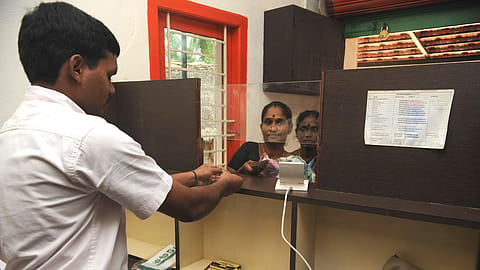India’s push for financial inclusion gets a fresh impetus
Pradhan Mantri Jan Dhan Yojana will now be an open-ended scheme and have double the overdraft facility along with a higher insurance cover.

Heading into a series of state elections as well as the general election of 2019, the government took an important decision for social welfare on Wednesday by making the Pradhan Mantri Jan Dhan Yojana (PMJDY) an open-ended scheme. The scheme, also known as the National Mission on Financial Inclusion, will now aim to provide every adult in every household a bank account.
Not only has the scheme been made an open-ended one, but Jan Dhan accounts opened after August 28 will get the added benefit of higher insurance—of Rs 2 lakh—under the Pradhan Mantri Suraksha Bima Yojana. All existing and new Jan Dhan accounts will also benefit from an overdraft limit of Rs 10,000, which is twice the existing limit. Further, the age limit for availing of the overdraft facility has also been raised to 65 years from the existing 60.
Addressing a media briefing after the Cabinet meeting, finance minister Arun Jaitley said the scheme has been very successful. “It has been recognised globally as one of the largest financial inclusion programmes anywhere in the world. It has been a boon to rural households, especially women as they are the largest beneficiaries of this scheme,” he said.
The PMJDY was the Narendra Modi government’s first major mission and it was launched on August 15, 2014. So far, 324 million (32.41 crore) accounts have been opened with deposits worth Rs 81,200 crore. Nearly 53% of the account holders are women and 59% belong to the rural and semi-rural regions. Jaitley said that about 83% of the Jan Dhan accounts are seeded with Aadhaar.
In another decision, the Union Cabinet also approved the establishment and operationalisation of permanent campuses at seven new Indian Institutes of Management (IIMs). These will be at a total cost of Rs 3,775.42 crore. Of this, Rs 2,804 crore will be spent for construction of the permanent campuses, while Rs 775.46 crore will be classified as recurring expenditure.
The new campuses will come up at Amritsar, Bodh Gaya, Nagpur, Sambalpur, Sirmaur, Visakhapatnam, and Jammu.
Each IIM would be built on 60,384 sq. m. and have infrastructure for 600 students, an official statement said. It added that “recurring grants” to these institutes had been approved at Rs 5 lakh per student per year, for five years. “Thereafter, the institutes are expected to meet their running cost/maintenance cost from the internal generation of funds,” the statement said.
Recommended Stories
According to the statement, construction of the permanent campuses shall be completed by June 2021. With this, all the 20 IIMs will have their own permanent campuses.